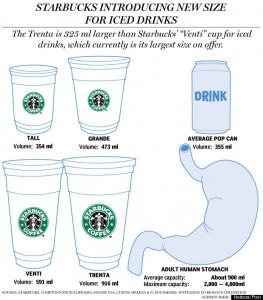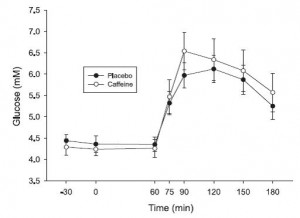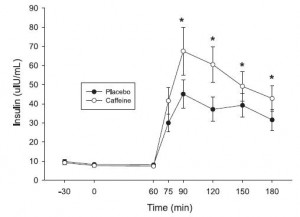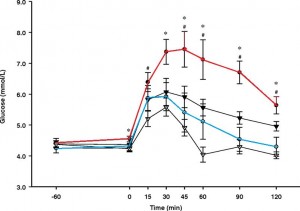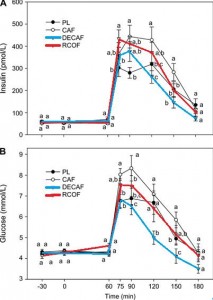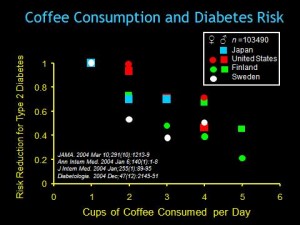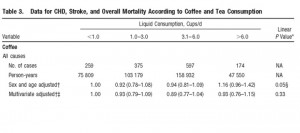Tired at night? Sleepy first thing in the morning? Bid farewell to your woes, Trenta has arrived.
One small step for man, 1 Litre of coffee for mankind.
>600 mg caffeine = ~10mg/kg
Bad news if you’re a spider…
Some observations about coffee
1) Caffeine vs. placebo
Acute caffeine reduces glucose tolerance. This would suggest adding sugar to coffee is a no-no. Sweetener? Perhaps. The jury is still out. The caffeine dose used in the study below is 5 mg/kg; that is HALF of the Trenta.
Graham et al., 2001 Canadian Journal of Physiological Pharmacology
2) Coffee vs. decaf
But wait! coffee (5 mg/kg; red line) vs. decaf (blue line) consumed prior to eating a high glycemic index meal (Moisey L L et al. Am J Clin Nutr 2008;87:1254-1261). Is caffeine the bad guy?
3) Coffee vs. decaf vs. caffeine vs. placebo
A Ha! Coffee was worse than decaf (Moisey et al. 2008; Battram et al., 2008) Caffeine (open circles) was worse than placebo (closed circles) (Graham et al., 2001; Battram et al., 2008) But caffeine is worse than coffee!?
Battram et al., Journal of Nutrition 2006
What does this mean? Caffeine is toxic? Coffee inhibits caffeine? Decaf was almost healthier than placebo.
Decaf + caffeine = coffee? What else does decaffeination do to coffee?
The whole is greater than the sum of its parts.
4) Coffee vs. diabetes risk
BUT epidemiological data suggest the opposite; coffee is protective.
5) Coffee vs. mortality
de Koning Gans et al., Arteriosclerosis, Thrombosis, and Vascular Biology. 2010
Coffee had no effect on mortality… or did it? High coffee drinkers tend to be less healthy – eat more, weigh more, and smoke a lot more than low coffee drinkers. Thus, uou’d expect their mortality to be higher due to lifestyle habits. but it’s not. Either coffee protects against the effects of a poor lifestyle, or we need to re-evaluate what defines a poor lifestyle.

